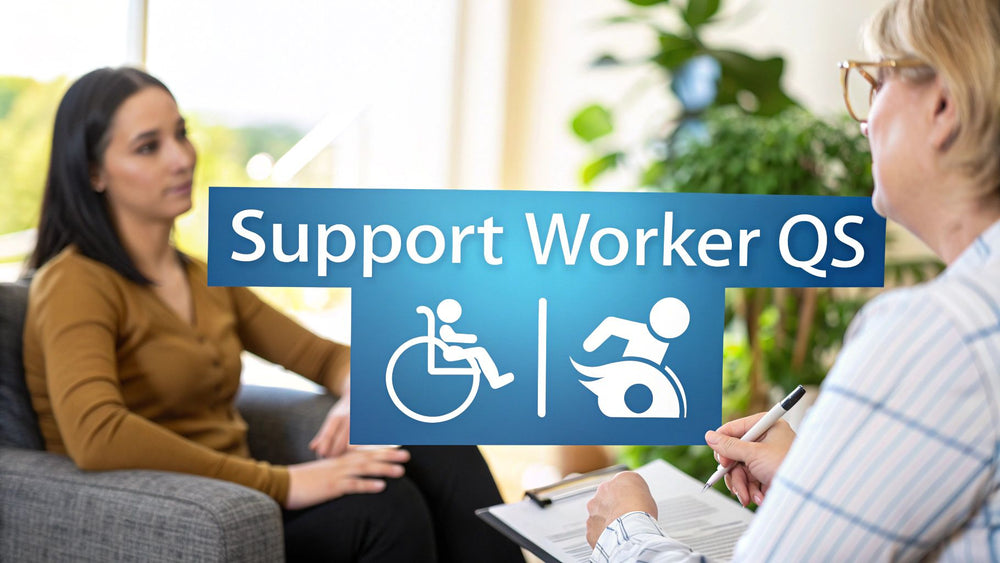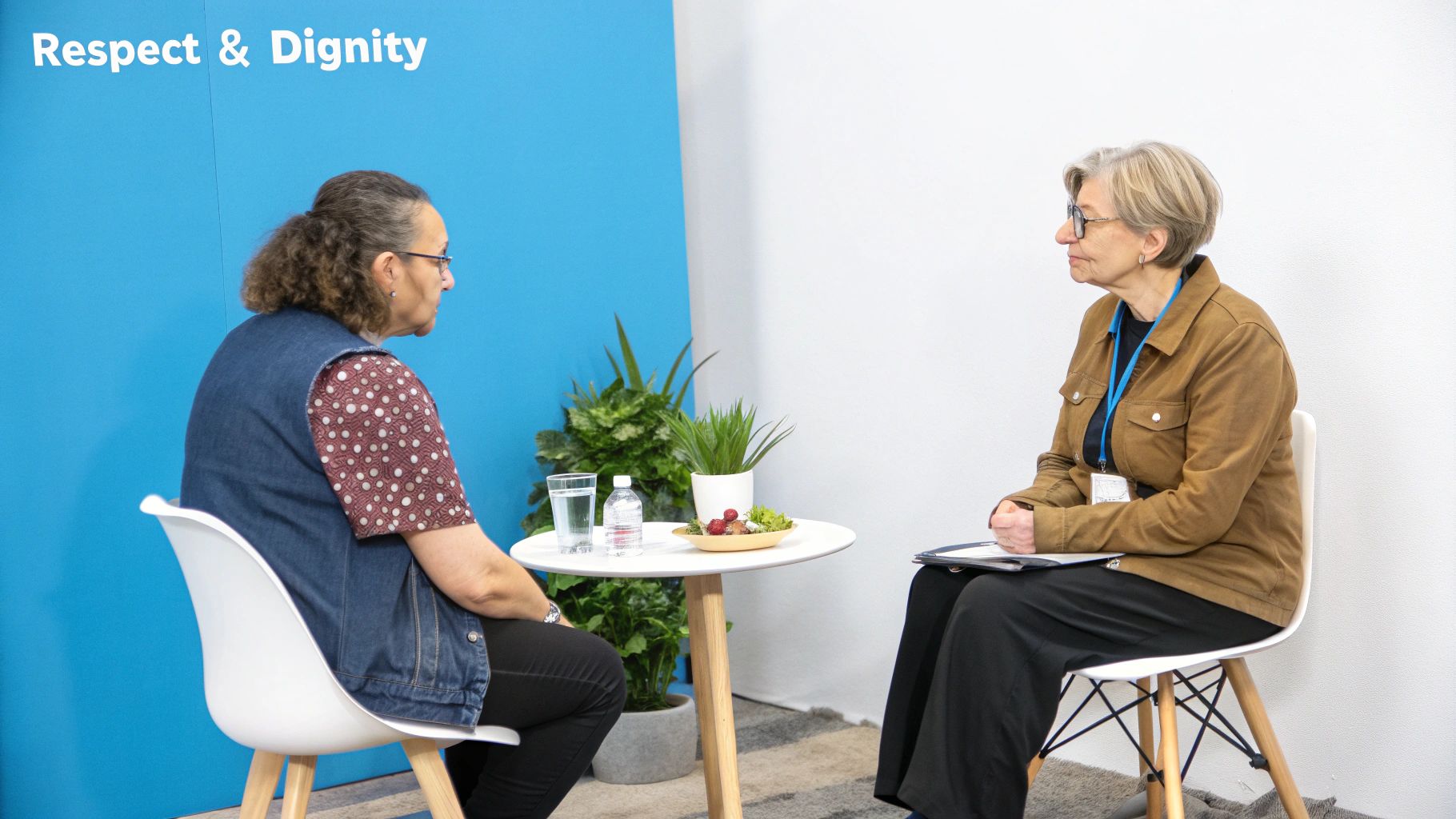Top 6 Disability Support Worker Interview Questions for 2025

Landing a role as a disability support worker is about more than just having the right qualifications; it's about demonstrating you have the compassion, resilience, and person-centred values to make a real difference. Hiring managers in Adelaide and across South Australia are looking for candidates who can articulate a deep understanding of the role's complexities and a genuine passion for empowering others. This guide is organised to help you prepare effectively, walking you through the most common disability support worker interview questions you'll encounter.
We will break down what employers are really asking with each question. You will find practical tips for structuring your answers and model responses to help you articulate your skills and experience with confidence. Our goal is to provide actionable insights that showcase your unique strengths. Whether you're new to the NDIS support sector or a seasoned professional, preparing for these specific questions is the key to standing out. This preparation will help you prove you’re the right fit for this rewarding and vital career, ready to provide exceptional support to individuals in your community.
1. Why do you want to work in disability support?
This is often one of the first and most crucial disability support worker interview questions you'll face. It's a foundational question designed to uncover your core motivations. The interviewer wants to see genuine passion and a solid understanding of what the role truly entails, moving beyond just the need for a job. They are assessing if your personal values align with the principles of providing compassionate, respectful, and empowering support.

Your answer should be a compelling narrative that connects your personal background, values, and professional goals to the mission of supporting people with disabilities. A great response demonstrates that you've reflected on the challenges and rewards of the sector and are committed to making a positive difference.
What the Interviewer is Really Asking
When an employer asks this, they are trying to understand several things:
- Your Motivation: Are you driven by a desire to help others and contribute meaningfully, or are you just looking for any job?
- Your Understanding: Do you grasp the realities of the role, including the emotional and physical demands?
- Your Values: Do your personal ethics align with a person-centred approach to care?
- Your Longevity: Are you likely to remain dedicated to the role and the organisation long-term?
How to Structure Your Answer
A strong response often weaves together personal experience with professional aspirations. Be authentic and specific.
Model Answer Example: "I've been drawn to disability support work because of my experience caring for my younger brother, who has cerebral palsy. Through helping him navigate daily tasks and access community activities, I saw firsthand the incredible impact that dedicated and patient support can have on someone's quality of life and independence. It taught me the importance of focusing on what a person can do, not what they can't. I'm now looking to turn that personal passion into a professional career where I can help other families and individuals achieve their goals and live fulfilling lives. I was particularly drawn to your organisation because of your strong focus on community integration, which I believe is vital."
This answer is effective because it is personal, specific, and links directly to the core values of disability support work. It shows resilience, empathy, and a pre-existing understanding of the role's demands, making it a powerful response to one of the most common disability support worker interview questions.
2. How would you handle challenging behaviours from clients?
This is a critical behavioural question among the most common disability support worker interview questions. It is designed to assess your practical skills, resilience, and professionalism when faced with difficult situations. The interviewer wants to gauge your ability to remain calm under pressure, prioritise safety, and uphold the dignity and rights of the person you are supporting.

Your response needs to show a clear understanding of person-centred approaches and de-escalation strategies. A strong answer will demonstrate that you see behaviour as a form of communication and that your first instinct is to understand the cause or trigger, rather than simply reacting to the behaviour itself.
What the Interviewer is Really Asking
When an employer asks this question, they are trying to understand:
- Your Temperament: Can you stay composed and professional during a high-stress incident?
- Your Approach: Do you prioritise a person-centred, empathetic response over a punitive one?
- Your Knowledge: Are you familiar with formal strategies like de-escalation, identifying triggers, and following Behaviour Support Plans?
- Your Judgement: Can you effectively assess risk and ensure the safety of the client, yourself, and others?
- Your Professionalism: Do you understand the importance of observation, documentation, and reporting incidents according to organisational policy?
How to Structure Your Answer
A well-structured answer should outline a clear, logical process. Start with prevention and understanding, move to immediate response, and finish with follow-up actions.
Model Answer Example: "When faced with challenging behaviour, my first priority is to ensure the safety of everyone involved while maintaining the client's dignity. My approach is to first try and understand the 'why' behind the behaviour, as it's often a form of communication. I would remain calm, using a non-confrontational tone and open body language to de-escalate the situation. I would try to identify and remove any immediate environmental triggers, such as loud noises or excessive crowding.
If a Behaviour Support Plan is in place, I would strictly follow its guidelines, as it provides specific strategies tailored to the individual. After the situation has been de-escalated and the client is calm, I would meticulously document the incident, noting the context, the behaviour, my response, and the outcome. This information is vital for reviewing and improving support strategies to prevent future occurrences."
This response is effective because it is structured, safety-focused, and highlights a proactive, person-centred mindset. It shows an understanding of formal processes (Behaviour Support Plans, documentation) and a commitment to both immediate de-escalation and long-term prevention, making it a comprehensive answer to this crucial disability support worker interview question.
3. Describe your experience working with people with disabilities
This is a critical, experience-based question that moves from your motivations to your practical capabilities. Interviewers use this prompt to gauge the depth and breadth of your hands-on experience. They want to understand not just what you've done, but what you’ve learned and how you've adapted your approach to support individuals with diverse needs.

Your answer should paint a clear picture of your background, highlighting specific skills and competencies you’ve developed. A strong response goes beyond simply listing past jobs; it demonstrates a deep understanding of individualised support and your ability to apply person-centred principles in real-world scenarios.
What the Interviewer is Really Asking
When posing this question, the hiring manager is looking for:
- Practical Skills: Have you assisted with personal care, administered medication, implemented behaviour support plans, or facilitated community access?
- Adaptability: Can you adjust your support style for someone with a physical disability versus someone with a psychosocial or intellectual disability?
- Problem-Solving: How have you handled challenges or unexpected situations in a support setting?
- Transferable Skills: If your experience is limited, can you connect skills from other roles (e.g., customer service, teaching) to the demands of disability support?
How to Structure Your Answer
Structure your response using the STAR method (Situation, Task, Action, Result) to provide concrete examples. Focus on achievements and learning outcomes rather than just job duties.
Model Answer Example: "In my previous role at a community day program, I supported a group of adults with varying intellectual disabilities. My primary task was to facilitate activities that promoted skill development and social inclusion. I took action by developing individualised activity plans based on each person's NDIS goals, which involved everything from a cooking class focused on independent living skills to a gardening project that built teamwork. As a result, one participant who was previously non-verbal began communicating more with his peers during the gardening activity, and another successfully learned to prepare a simple meal independently. This experience taught me the importance of tailoring support to individual goals and the incredible value of patience and creative thinking. It also reinforced many of the core disability support worker skills that are vital for this line of work."
This answer is effective because it is specific, highlights key responsibilities, and demonstrates a positive outcome. It showcases the candidate's ability to apply person-centred practices and reflects on what they learned, making it a powerful response to one of the most revealing disability support worker interview questions.
4. How do you ensure dignity and respect in your interactions with clients?
This is one of the most critical values-based disability support worker interview questions. It moves beyond practical skills to probe your fundamental understanding of human rights and ethical practice. The interviewer wants to confirm that you see clients as individuals with autonomy and rights, not just as a set of tasks to be completed. They are assessing your commitment to upholding the core principles that prevent patronising or disempowering interactions.

Your response needs to demonstrate a deep-seated respect for the people you support. A strong answer will go beyond simply saying "I am respectful" and provide concrete examples of how you put principles like consent, privacy, and choice into action every day. This shows you can translate abstract values into tangible, respectful support.
What the Interviewer is Really Asking
When an employer asks this, they are trying to understand several things:
- Your Core Values: Do you inherently believe in the right of every person to be treated with dignity?
- Your Practical Application: Can you describe specific actions that demonstrate respect?
- Your Professional Boundaries: Do you understand the importance of maintaining confidentiality and privacy?
- Your Philosophy of Care: Do you embrace a model that empowers clients and gives them control over their own lives? This is central to successful person-centred approaches.
How to Structure Your Answer
A powerful answer should focus on actionable behaviours. Use specific scenarios and language that reflect a modern, rights-based approach to disability support.
Model Answer Example: "For me, ensuring dignity and respect is the foundation of this work, and it's reflected in everything I do. A key practice for me is always using person-first language and asking a client how they prefer to be addressed. I make a point to always seek consent before providing any physical assistance, explaining what I'm about to do and why. For example, instead of just starting a task, I'll ask, 'Would you like some help with your jacket now?' This reinforces their autonomy. I am also meticulous about respecting privacy, ensuring conversations about their support are held in private and their personal information is kept confidential. Ultimately, my goal is to be a partner in their support, always honouring their choices and preferences, even if they differ from my own."
This answer is effective because it provides tangible examples of respectful behaviour, such as seeking consent and using person-first language. It showcases an understanding of key principles like autonomy and confidentiality, proving the candidate can apply these crucial values in a real-world setting.
5. Describe a time when you had to work as part of a team
Disability support is rarely a solo endeavour. This question assesses your ability to collaborate effectively with the diverse group of people involved in a participant's life. This includes family members, healthcare professionals, therapists, and other support workers. Your interviewer wants to see that you can communicate, coordinate, and contribute positively to a multidisciplinary team.
Effective teamwork ensures a holistic and consistent approach to care, where everyone is working towards the same goals for the participant. A strong answer will showcase your ability to be a reliable team player who respects different roles and expertise while always advocating for the participant's needs. This is a critical skill for creating a seamless support network.
What the Interviewer is Really Asking
When posing this behavioural question, the employer is looking for evidence of:
- Collaboration Skills: How do you work with others who have different responsibilities and perspectives?
- Communication: Can you share information clearly and listen effectively to other team members?
- Conflict Resolution: How do you handle disagreements or different opinions within a team setting?
- Professionalism: Do you respect the expertise of others, such as occupational therapists or medical staff?
- Client Advocacy: Can you effectively represent the participant's needs and preferences within the team?
How to Structure Your Answer
Use the STAR method (Situation, Task, Action, Result) to provide a clear and concise example. Choose a scenario, preferably from a previous care or support role, that highlights successful collaboration.
Model Answer Example: "In my previous role, I was part of a support team for a young man with an acquired brain injury who wanted to increase his social participation. The situation involved coordinating his schedule with his family, his physiotherapist, and the organisers of a local hobby group he wanted to join. My task was to ensure his support was consistent and that all parties were informed of his progress and any challenges.
My action was to initiate a weekly communication loop via a shared digital diary. I documented his physio exercises and progress, shared feedback from the hobby group with his therapist, and coordinated with his family on transport. When the physiotherapist suggested a new mobility aid, I worked with her to learn how to use it correctly and then ensured the family understood its benefits for community access.
The result was a coordinated and successful integration into the hobby group. The participant felt confident, his family felt included, and his therapist could tailor his sessions based on real-world feedback. This experience solidified my belief in how crucial teamwork is for enabling meaningful community access support services."
This response is effective because it demonstrates practical collaboration, clear communication, and a focus on the client's outcome, making it a compelling answer to one of the most important disability support worker interview questions.
6. How do you handle confidentiality and privacy concerns?
This question is a cornerstone of any disability support worker interview, as it directly addresses your understanding of professional ethics and legal obligations. An employer needs to be certain that you can be trusted with highly sensitive personal information. Your response will demonstrate your professionalism, integrity, and commitment to upholding the dignity and rights of the people you support.
How you answer this question shows your awareness of the strict boundaries that govern the support worker-client relationship. It’s about more than just keeping secrets; it’s about actively protecting a person’s private information in all settings, from securing documents to being discreet in public.
What the Interviewer is Really Asking
When an interviewer poses this ethics-based question, they are probing for several key competencies:
- Legal Awareness: Do you know about relevant privacy legislation, such as the Privacy Act and NDIS Code of Conduct?
- Professional Boundaries: Can you differentiate between what information is appropriate to share and what must be kept private?
- Practical Application: How would you translate your knowledge into action in day-to-day scenarios, like documentation and conversations?
- Trustworthiness: Can you be relied upon to protect the client, their family, and the organisation from breaches of privacy?
How to Structure Your Answer
A comprehensive answer should demonstrate both theoretical knowledge and practical application. Reference specific principles and give concrete examples of how you would apply them.
Model Answer Example: "I understand that maintaining confidentiality is a fundamental legal and ethical responsibility in this role. My approach is always to treat a client’s information with the utmost respect and security. This means never discussing client details with anyone who isn't authorised, including my own family or friends. In a practical sense, I would ensure all written notes are stored securely in a locked file or on a password-protected system, and I would be mindful of my surroundings when discussing sensitive matters, for instance, not doing so in a public café.
I also understand that confidentiality has limits, particularly concerning mandatory reporting for safety risks. I am aware of my duty of care and would follow organisational policy to report any concerns about harm or abuse to the appropriate authority. Ultimately, my actions are guided by the principle of client consent, ensuring that information is only shared when necessary and with the client’s explicit permission, as would be outlined in their service agreement."
This response is strong because it acknowledges legal duties, provides practical examples of secure handling, and shows a nuanced understanding of when sharing information is necessary for safety, demonstrating a mature and responsible approach to one of the most critical disability support worker interview questions.
Disability Support Worker Interview Questions Comparison
| Question / Aspect | Implementation Complexity 🔄 | Resource Requirements ⚡ | Expected Outcomes 📊 | Ideal Use Cases 💡 | Key Advantages ⭐ |
|---|---|---|---|---|---|
| Why do you want to work in disability support? | Low – straightforward interview question | Minimal – verbal responses only | Insights into motivation, passion, and values alignment | Screening for genuine interest and cultural fit | Filters committed candidates; shows self-awareness |
| How would you handle challenging behaviors from clients? | Medium – requires scenario discussion | Moderate – experience or training based | Predicts crisis management and empathy skills | Evaluating ability to manage difficult client situations | Reveals problem-solving and emotional regulation |
| Describe your experience working with people with disabilities | Medium – experience recount required | Moderate – depends on candidate background | Concrete evidence of practical skills and adaptability | Assessing relevant hands-on experience | Demonstrates real-world application and growth |
| How do you ensure dignity and respect in your interactions with clients? | Low – values-based question | Minimal – qualitative answers | Understanding of human rights and person-centered care | Assessing alignment with client empowerment principles | Ensures respect for autonomy and client dignity |
| Describe a time when you had to work as part of a team | Medium – behavioral example needed | Moderate – communication skills | Gauges collaboration and conflict resolution ability | Evaluating teamwork in multidisciplinary settings | Shows interpersonal skills and leadership potential |
| How do you handle confidentiality and privacy concerns? | Low – ethics and knowledge-based | Minimal – awareness and explanation | Ensures knowledge of privacy laws and professional ethics | Assessing compliance and trustworthiness | Builds professional trust; predicts ethical behavior |
Putting Your Best Foot Forward with Confidence
Navigating the interview process to become a disability support worker is more than just a formality; it's your first opportunity to demonstrate the empathy, resilience, and person-centred values that define an exceptional care professional. The disability support worker interview questions we've explored are not designed to trip you up. Instead, they are invitations to share your unique perspective, showcase your problem-solving skills, and reveal your genuine passion for empowering others.
By preparing thoughtful, specific examples for each question, you move beyond generic answers and provide concrete evidence of your capabilities. Remember, the most impactful responses are those that are authentic. An interviewer in Adelaide, or anywhere in South Australia, is looking for a real person who can connect with clients on a human level, not someone who has simply memorised the "perfect" answer.
Key Takeaways for Interview Success
To truly stand out, focus on these core principles as you refine your answers:
- Emphasise Person-Centred Care: Always bring your answers back to the individual. Whether discussing challenging behaviours or teamwork, frame your response around achieving the best outcome for the client, respecting their choices, and upholding their dignity.
- Use the STAR Method: Structuring your answers using the Situation, Task, Action, and Result (STAR) method is a powerful way to add clarity and impact. It transforms a simple claim like "I'm a good team player" into a compelling story that proves it.
- Show, Don't Just Tell: Instead of saying you are compassionate, describe a situation where your compassion made a difference. Instead of stating you respect confidentiality, explain the specific steps you take to protect a client’s privacy. Actionable examples are your greatest asset.
Your Next Steps to a Fulfilling Career
Mastering your responses to these common disability support worker interview questions is a significant step towards securing a role where you can make a real difference. The goal is to walk into that interview room not with a script, but with a collection of personal stories and a clear understanding of your own values. When you can confidently articulate why you want this role and how your skills align with the principles of quality support, you are not just answering questions; you are demonstrating your readiness to contribute positively to someone's life.
This preparation shows a level of professionalism and dedication that organisations highly value. It proves you are serious about the responsibilities of the role and have a deep respect for the individuals you will be supporting. By connecting your personal philosophy with the practical demands of the job, you present yourself as a well-rounded, capable, and compassionate candidate ready to empower NDIS participants and help them achieve their goals.
Are you a passionate individual looking to start or advance your career in disability support in Adelaide or regional South Australia? Vana Care is always searching for dedicated professionals who share our commitment to person-centred care. Visit the careers page on our Vana Care website to explore current opportunities to join a team that values compassion and empowers both clients and staff.


